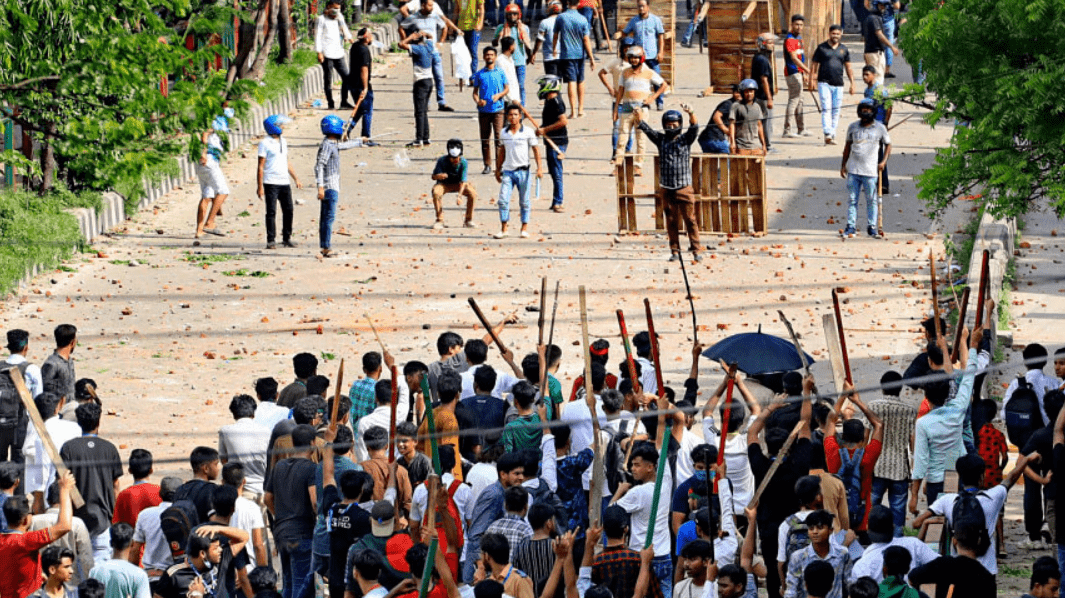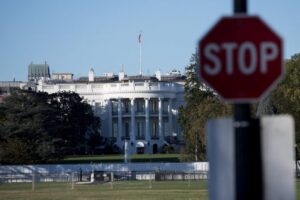
Argentina’s recent victory in the 2024 Copa América, after beating Colombia 1-0 in the final in Miami, sparked celebrations around the world. In Bangladesh, a country with more than 172 million inhabitants, fans of the Albiceleste took to the streets en masse to celebrate their second championship.
Thousands of Bangladeshis dressed in Argentine jerseys and flags celebrated in different cities, and images of the festivities quickly went viral on social media, highlighting the passion of Bangladeshis for football and, in particular, for the Argentine national team.
However, the euphoria over Argentina’s victory was short-lived. Just 48 hours after these celebrations, Bangladesh was engulfed in a series of massive protests that resulted in hundreds of injuries and six deaths. Dozens of people were injured after police used tear gas and baton-charged during violent clashes between a pro-government student body and protesting students at Jahangir Nagar University in Savar, outside Dhaka.
The violence erupted early Tuesday as protesters demanded the suspension of a quota for government jobs for relatives of fighters from Bangladesh’s 1971 war of independence. The quota system, in addition to reserving jobs for relatives of fighters, also reserves government jobs for women, the disabled and members of ethnic minorities. Suspended in 2018, Bangladesh’s High Court last month ordered the 30% quota for descendants of veterans to be reinstated, sparking fresh protests.
Despite the Supreme Court staying the High Court order for four weeks, asking protesters to return to school, violence escalated significantly. Clashes between protesters and Chhatra League men and police left at least six dead and several hundred injured across the country.

Three of the dead, including two students, were killed in clashes in Chattogram. In the capital, two people were killed after being attacked in the Dhaka College and Science Lab areas, where protesters and Chhatra League activists fought pitched battles for more than seven hours. In Rangpur, a student from Begum Rokeya University was killed in police firing during a protest.
Angered by the Chhatra League’s attacks on the Dhaka University campus on Monday, protests over quotas quickly mushroomed with students from private universities and colleges taking part. Similar clashes took place in Rajshahi, Bogura, Jhenidah, Cox’s Bazar, Narsingdi, Sirajganj, Barishal, Kishoreganj and Faridpur.
Internet Service Reportedly Shut Down / Slowed Down Around Dhaka University Area For Now
Guess Thats All For Tonight
Action Starts Tomorrow Morning Again pic.twitter.com/AAppepSDI6
— Son of Bengal
(@iSoumikSaheb) July 14, 2024
In response to the escalating violence, the University Grants Commission (UGC) declared that all public and private universities, their affiliated medical colleges and other institutions will remain closed until further notice for the safety of students. A UGC order urged university authorities to take steps to make students vacate their dormitories.
The acting chairman of the UGC, Professor Muhammed Alamgir, said the measures were taken in line with the government’s decision. There are 55 public and 114 private universities in the country, all of which are affected by the move.
Hundreds Of General Students Got Attacked In Violent Clash Between Anti Quota Protesters And Government Students Wing.
Quota Protesters Alleged That Governments Student Wing Attacked Them
This Is Going Out Of Hand #Bangladesh #QuotaReformProtest #Quotamovement2024 pic.twitter.com/c9bybgMt5g
— Son of Bengal
(@iSoumikSaheb) July 15, 2024
Protesters demanding reform of the quota system in public employment have said they will continue their movement until their demands are met. Hasnat Abdullah, one of the coordinators of the student movement against quotas, denounced state-sponsored attacks on protesters and said the movement will continue until its goals are achieved. “Our movement will continue until our demands are met,” he said while addressing the gathering at the end of his programme in front of the residence of the vice-chancellor of Dhaka University at around 8:45 p.m.
The situation in Bangladesh reflects a deep divide in society, where joy over sporting success contrasts with despair and violence stemming from internal problems. As the country continues to grapple with these tensions, the international community is closely watching developments and their potential implications for Bangladesh’s stability and future.

He is a student at the Faculty of Law of the National University of Cuyo, Mendoza, Argentina. He is a member of the Faculty’s Research Group and of the Study Group on India and Southeast Asia of the National University of Rosario. He also completed the Diploma in Law and Digital State 4.0. He is an intern at SHEN, a business consultant with Asia, and an editor at ReporteAsia.
Source: https://reporteasia.com/politica/2024/07/16/bangladesh-entre-festejos-argentina-represion-universitaria/

